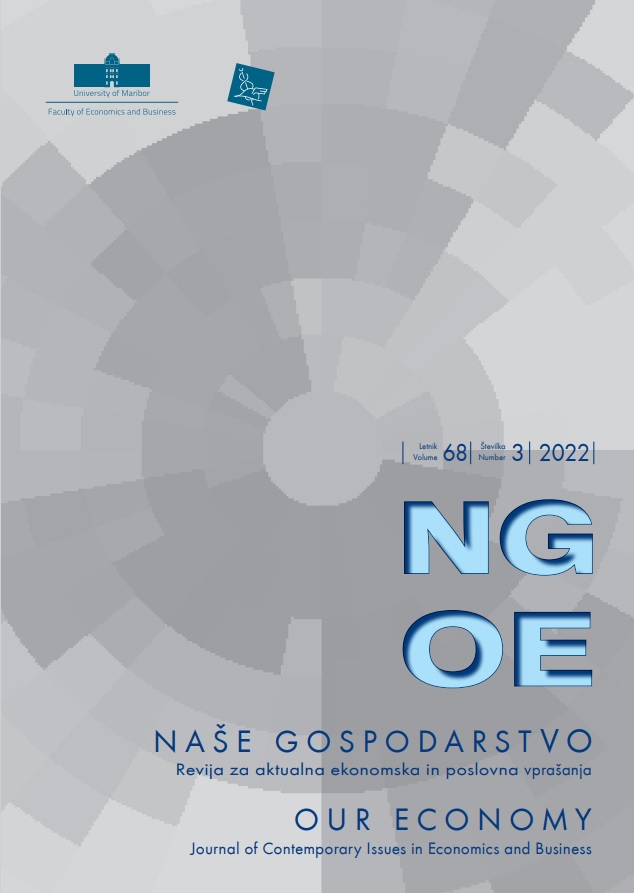Past, Present, and Intended Digitalization around the World: Leading, Catching up, Forging Ahead, and Falling Behind
Ključne besede:
digitalizacija, sprejetje tehnologije, zunanji dejavnik, globalizacija, neenakost, konvergenca, divergencaPovzetek
Podjetja po vsem svetu uvajajo digitalno tehnologijo. Sprejemanje pa ni enakomerno, temveč se spreminja skozi čas in se razlikuje od družbe do družbe glede na vire v ekosistemu. Ta študija obravnava razvoj pretekle, sedanje in prihodnje digitalizacije v svetu in v vsaki družbi glede na njene vire. Raziskava med podjetji v 47 državah, ki jo je leta 2021 izvedel Globalni podjetniški monitor, zagotavlja meritve na nacionalni ravni glede sprejemanja digitalnih tehnologij pred in med pandemijo ter namen sprejetja v bližnji prihodnosti. Ugotovljeno je bilo, da se sprejetje digitalne tehnologije znatno razlikuje tako v času kot v kraju. Pred pandemijo je bila uporaba digitalne tehnologije osredotočena na najbogatejše družbe. Pandemija je bila zunanji dejavnik, ki je neodvisno od nacionalnih gospodarstev prisilil manj digitalizirane družbe, da so nadoknadile zaostanek, kar je povzročilo določeno konvergenco. Zgodnji pandemiji so sledile namere za digitalizacijo, ki so se zelo razlikovale, kar je pomenilo določeno razhajanje. V nekaterih družbah, ki napredujejo, so namere močne, v nekaterih manj digitaliziranih družbah in družbah z nizkimi dohodki, ki morda zaostajajo, pa so šibkejše. Ugotovitve prispevajo k razumevanju digitalizacije kot globalnega pojava, pandemija pa je bila zunanji dejavnik, ki je spodbujal dohitevanje in konvergenco pri digitalizaciji. Kljub temu je okrevanje neenakomerno in povzroča razlike, saj nekatere družbe napredujejo, druge pa zaostajajo.
Literatura
Abramovitz, M. (1986). Catching up, forging ahead, and falling behind. Journal of Economic History, 46(2), 385-406. DOI: https://doi.org/10.1017/S0022050700046209
Agarwal, R., & Audretsch, D. (2020). Looking forward: Creative construction as a road to recovery from the COVID-19 crisis. Strategic Entrepreneurship Journal, 14, 549–551. DOI: https://doi.org/10.1002/sej.1378
Amankwah-Amoah, J., Khan, Z., Wood, G., & Knight, G. (2021). COVID-19 and digitalization: The great acceleration. Journal of Business Research, 136, 1, 602-611. DOI: https://doi.org/10.1016/j.jbusres.2021.08.011
Autio, E., R. Mudambi, & Yoo, Y. (2021). Digitalization and globalization in a turbulent world: Centrifugal and centripetal forces. Global Strategy Journal, 11, 3-16. DOI: https://doi.org/10.1002/gsj.1396
Bosma, N. (2013). The Global Entrepreneurship Monitor (GEM) and its impact on entrepreneurship research. Foundations and Trends in Entrepreneurship, 9(2), 143-248. DOI: https://doi.org/10.1561/0300000033
Calvo, N., T. Schøtt, A. Fernandez Laviada, M. Samsami, & Barros, E. (2022). The Digitization of Spanish companies during the pandemic. Differences between CCAA. Cuadernos de divulgacion cientifica 1/2022. RED GEM Espana. Retrieved from http://www.gem-spain.com.
Cruz-Jesus, F., Oliveira, T., Bacao, F., & Irani, Z. (2017). Assessing the pattern between economic and digital development of countries. Information Systems Frontiers, 19(4), 835–854.
Davidsson, P., Recker, J., & von Briel, F. (2021). COVID-19 as external enabler of entrepreneurship practice and research. Business Research Quarterly, 24(3), 214-223. https://doi.org/10.1177/23409444211008902
Dencker, J. C., Bacq, S., Gruber, M., & Haas, M. (2021). Reconceptualizing necessity entrepreneurship: A contextualized framework of entrepreneurial processes under basic needs. Academy of Management Review, 46(1), 60–79. DOI: https://doi.org/10.5465/amr.2017.0471
Global Entrepreneurship Monitor. (2022). Global Entrepreneurship Monitor 2021/2022 Global Report: Opportunity Amid Disruption. London: GEM.
Hai, T. N., Van, Q. N., & Thi Tuyet, M. N. (2021). Digital transformation: Opportunities and challenges for leaders in the emerging countries in response to Covid-19 pandemic. Emerging Science Journal, 5, 21–36. DOI: https://doi.org/10.28991/esj-2021-SPER-03
Karim, M.S., S. Nahar, & M. Demirbag. (2022). Resource-based perspective on ICT use and firm performance: A meta-analysis investigating the moderating role of cross-country ICT development status. Technological Forecasting and Social Change, 179, 121626.
Kraus, S., Jones, P., Kailer, N., Weinmann, A., Chaparro-Banegas, N., & Roig-Tierno, N. (2021). Digital transformation: An overview of the current state of the art of research, SAGE Open, July-September 2021, 1-15. https://doi.org/10.1177/21582440211047576
Lafuente, E., Acs, Z. J., Sanders, M., & Szerb, L. (2020). The global technology frontier: Productivity growth and the relevance of Kirznerian and Schumpeterian entrepreneurship. Small Business Economics, 55, 153–178. DOI: https://doi.org/10.1007/s11187-019-00140-1
Leão, P., & da Silva, M. M. (2021). Impacts of digital transformation on firms’ competitive advantage: A systematic literature review. Strategic Change, 30, 421-441. DOI: https://doi.org/10.1002/jsc.2459
Martin, R., & Sunley, P. (2020). Regional economic resilience: Evolution and evaluation. In Handbook on Regional Economic Resilience. Cheltenham, UK: Edward Elgar Publishing. DOI: https://doi.org/10.4337/9781785360862.00007
Nambisan, S., & Baron, R.A. (2019). On the costs of digital entrepreneurship: Role conflict, stress, and venture performance in digital platform-based ecosystems. Journal of Business Research, 125, 520-532. DOI: https://doi.org/10.1016/j.jbusres.2019.06.037
Futonge Nzembayie, K., & Buckley, A. (2022). Digital Entrepreneurship: Disruption and New Venture Creation. Cheltenham: Edward Elgar Publishing.
OECD. (2021). The digital transformation of SMEs. Paris: OECD Publishing. DOI: https://doi.org/10.1787/bdb9256a-en
Solberg, E., Traavik, L.E.M., & Wong, S.I. (2020). Digital mindsets: recognizing and leveraging individual beliefs for digital transformation. California Management Review, 62, 4, 105–124. DOI: https://doi.org/10.1177/0008125620931839
Song, A. K. (2019). The digital entrepreneurial ecosystem: A critique and reconfiguration. Small Business Economics, 53(3), 569–590. https://doi.org/10.1007/s11187-019-00232-y
Stam, E. (2021). A culture of ambitious entrepreneurship. Utrecht: Utrecht School of Economics Research Institute. Working Paper Series 21-12. Retrieved from https://dspace.library.uu.nl/handle/1874/416937
Stam, E., & Van de Ven, A. (2019). Entrepreneurial ecosystem elements. Small Business Economics, 56, 2, 809-832. DOI: https://doi.org/10.1007/s11187-019-00270-6
Sussan, F., & Acs, Z. J. (2017). The digital entrepreneurial ecosystem. Small Business Economics, 49(1), 55–73. DOI: https://doi.org/10.1007/s11187-017-9867-5
Szerb, L., Komlosi, E., Acs, Z. J., Lafuente, E., & Song, A.K. (2022). The Digital Platform Economy Index 2020. SpringerBriefs in Economics, No. 978-3-030-89651-5, July. DOI: https://doi.org/10.1007/s11187-017-9867-5
World Bank. (2016). World Development Report 2016: Digital Dividends. Washington, DC: World Bank.
Wurth, B., Stam, E., & Spigel, B. (2021). Toward an entrepreneurial ecosystem research program. Entrepreneurship Theory and Practice, 46(3), 729-778. DOI: https://doi.org/10.1177%2F1042258721998948.
